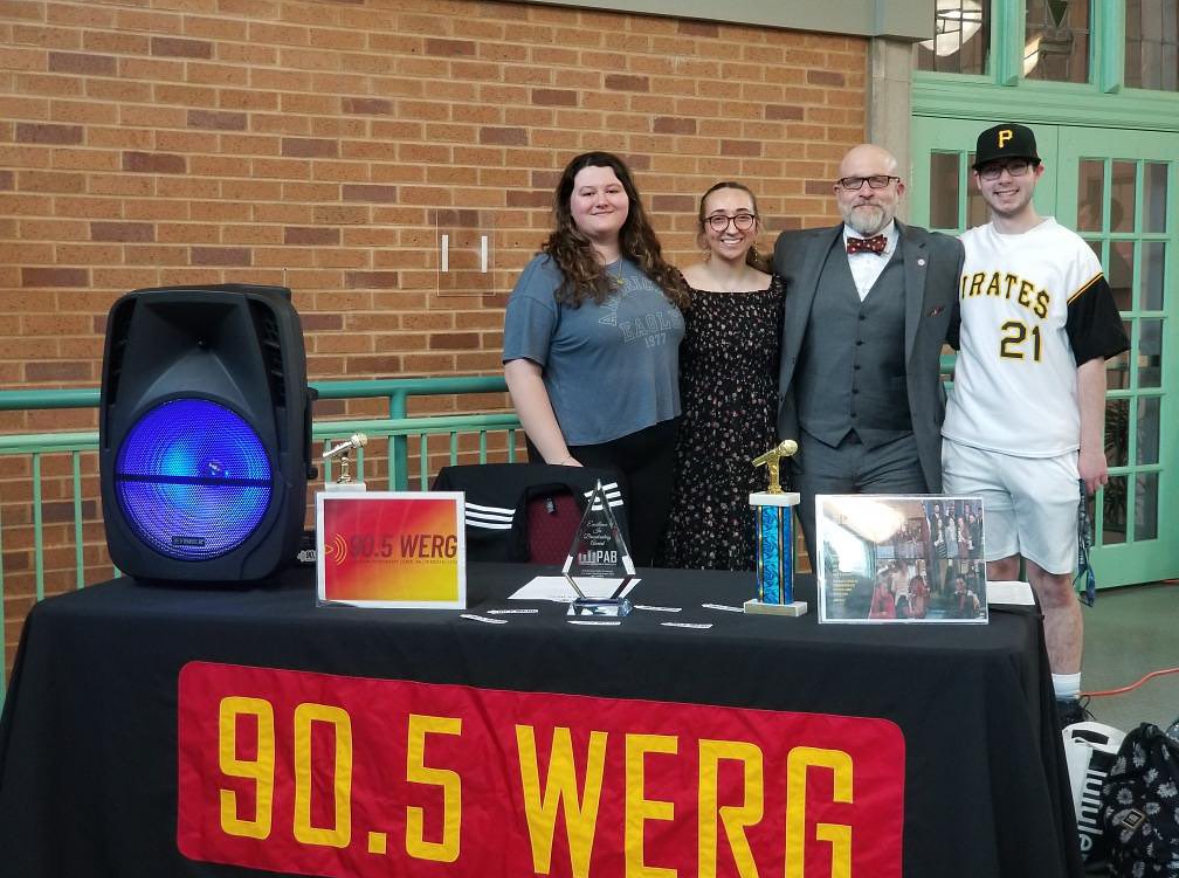In the age of technology, college students use Google, cell phone apps and flash drives to increase their efficiency and keep up with today’s fast-paced society. The current generation of students has grown up with technology – EBSCOhost and GoogleBooks have replaced the Dewey decimal system, and Facebook makes telephone directories seem grossly juvenile. With technology ingrained in daily life, it’s even socially acceptable to bypass face-to-face communication in many situations – but not in the context of a breakup, according to Gannon University students.
Steve Large, Ph.D., director of counseling services at Gannon, said that he believes technology has become an easy way out for people to break up with someone, express emotions or deal with conflict in general. It’s no wonder; the Pew Internet American Life Project reported that 93 percent of young people are online, 73 percent use MySpace or Facebook and 75 percent own cell phones.
The prevalence of everyday technology may affect the way that students approach confrontation, according to Large. “Using technology to deal with conflict and emotion decreases students’ opportunity to learn assertive skills,” he said.
When breakups occur through texting or Facebook, students often don’t experience closure, he added.
“When you go through a breakup in person, you see the other person’s face and nonverbal messages and are able to say goodbye, which helps with the grief stages,” Large said. “Breakups through technology implicitly send the message that the other person isn’t important enough to meet face-to-face…ouch.”
Gannon students seem to agree that technology isn’t an ideal channel to “dump” a significant other. Bryan Sundy, a junior sport and exercise science major, said that a text message or email would be the worst way to break up with someone, and senior engineering major Leanne Bennett and sophomore liberal arts major Brit Dominguez added an answering machine message and another person, respectively, as bad.
Chad Gauthier, a senior information systems/theatre and communications major, said that realizing you have no intention to remain committed to your significant other and failing to inform them is also an inappropriate way of breaking off a relationship.
“I would say the worst possible way – without actually breaking up with someone – is cheating on someone,” Gauthier said. In some cases, he said that cheating on a significant other could end up being a mistake that can be fixed, but simply failing to have the breakup conversation before showing disloyalty would probably be the worst possible situation.
Large said that the best way to break up with a significant other is in person, while acting as the leader in the conversation so that the other person isn’t left guessing how you feel. “Don’t hem-haw around it – be direct,” Large said.
Gauthier said he agrees that breaking up with someone in person is the best method. “There are so many intricacies in communication that happen in person rather than over the phone, in a text message, or even a change in a Facebook status,” he said. “You basically need to say, ‘Here are the problems, and this is why it won’t work. We have already addressed these problems, and I haven’t seen improvements on these issues that we have.’”
Sam Brehm, a senior sport and exercise science major, said he thinks it is best to communicate your emotions in an honest way. “Bring it up, discuss it, wait a couple days, and then see what’s going on,” he said. “You have to challenge the relationship before you just end it.”
Junior chemistry major Amanda Schmiedl said that the best way to dump someone is in person, but not at a public venue. “The best way is face-to-face in a private area, where if screaming or crying occurred, it wouldn’t be awkward,” she said.
Large also said that when breaking up with someone, ask the person you are breaking up with if they feel comfortable with a friendship – if you want one – and then respect their need for space if they don’t. He said that he believes breakups involve a form of grief for the individuals involved.
“Grieving the loss of a relationship is similar to grieving the death of someone close, except it’s more complicated, because you still see that person,” Large said. “It’s difficult to learn how to integrate that loss into your daily life.”
Brehm said that he thinks it is harder to be on the dumping side of the breakup equation, because you don’t want the other person to think you don’t care. “You don’t want them thinking your intentions were bad the whole way through,” he said.
Gauthier said he agrees that dumping someone is the more difficult role in a breakup, because it can be easier to move on faster if you’re the one who has been dumped. He said that more blame is placed on the person doing the dumping, so that individual feels more guilt.
“You think things like, ‘Well how are they feeling because of me,’ and that makes you feel worse,” Gauthier explained. “But then again, being dumped can be bad, too, because it can be you wanting to be in the relationship and the other person not, so I guess it depends on where you stand.”
Rachel Golombek, a junior occupational therapy major, said she sides with the person getting dumped. “You think the person loved you more than what they’re doing to you, so then it’s just really hurtful,” she said. “It’s hurtful to the person doing the dumping, but they know it’s coming, so they’ve already been dealing with it.”
Bennett also said she thinks it is worse to get dumped, because sometimes that person doesn’t expect that the breakup is coming. “You don’t have any control in that situation, so you feel powerless,” she said.
Schmiedl said that judging from her experiences, dumping someone is always worse than getting dumped. “When I did it, I knew how that person felt, and I hated being the person making them feel how I once felt,” she said.
Regardless of which side has it worse, students said that both parties are impacted by the breakup, which can affect students’ academic lives. “Breakups can definitely play a factor on performance in the classroom, especially at a smaller school like Gannon, because you might have a class with that person,” Sundy said.
To effectively work through breakup grief, and lessen its impact on academics, Large suggested coping steps for both individuals involved in the breakup.
For the person being dumped, Large said that the first step is to allow the person doing the dumping to experience the loss of his or her ex. “Students often try to be friends right after a breakup, giving the person who has broken up with them the best of both worlds,” he said. “If your significant other made the decision to leave your life, you should respect their decision and let them experience the loss of you.”
Large also warned against technology, saying that it can complicate the grief process. “Avoid Facebook at all costs,” he said.
Lastly, Large said to get support if you are experiencing grief from a breakup. “Often, students want to internalize negative emotions, leading to the buildup of shame, which is a nasty thing,” he said. “When you are able to express your emotions, it’s easier to process them..”
Addressing the other side of the dumping equation, Large advised the person initiating the breakup to use honesty and clarity. “It’s understandable to want to postpone a breakup to avoid a sad situation and hurting that person, but avoidance adds exponentially more pain to the breakup,” he said.
Dominguez and Golombek also said that honesty is an essential component in a breakup situation. “You might feel guilty, but at the same time, you’re finally ending something that you didn’t want,” Dominguez said.
Large said to try to avoid mixed messages when breaking up with someone and be clear that ending the relationship is your desired intention. He added that breaking up with someone shouldn’t be used as an opportunity to bring up new arguments or critiques. “Just end it – don’t kick them while they’re down.”
He also said to communicate whether you would like to have a friendship with that person after the relationship is over. “Before having the conversation, ask yourself whether you want to have your ex as a friend or not,” Large said.
Friends can provide an essential support system for college students, especially if they are far away from their families. Large suggested several ways to help a friend work through a breakup and handle a sticky situation if you’re friends with both parties.
Large first said to help your friend normalize what they may be feeling, which means to let them know that they are not alone in their experience. After letting your friend know that their grief response is normal, Large said to make sure that you aren’t hindering them from working through the grief process.
“Don’t make false promises or give false hope, such as, ‘Give it time, they’ll realize they made a mistake,’” Large said. He also said not to communicate with your friend about what your ex is doing, regardless if it is positive or negative. “If you do, you may be acting as a catalyst for negative feelings,” he said.
Large said that if you are friends with that person’s ex, be candid with both of them, and communicate with them about how you are going to manage their friendships. “If you are mutual friends with their ex – which many students are at a smaller school like Gannon – this is your chance to practice your skills with assertiveness,” Large said.
Lastly, Large warned against breaking the cardinal friend rule: “And please, don’t date their ex.”
And yes, even if it isn’t Facebook official, it still counts.
Courtney Lewis







